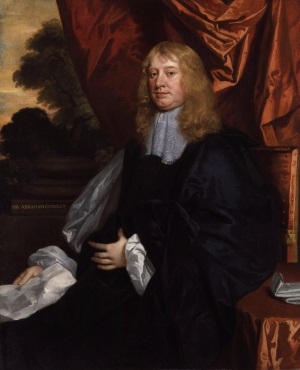Abraham Cowley
On the Death of Mr. William Hervey
IT was a dismal and a fearful night:
Scarce could the Morn drive on th’ unwilling Light,
When Sleep, Death’s image, left my troubled breast
By something liker Death possest.
My eyes with tears did uncommanded flow,
And on my soul hung the dull weight
Of some intolerable fate.
What bell was that? Ah me! too much I know!
My sweet companion and my gentle peer,
Why hast thou left me thus unkindly here,
Thy end for ever and my life to moan?
O, thou hast left me all alone!
Thy soul and body, when death’s agony
Besieged around thy noble heart,
Did not with more reluctance part
Than I, my dearest Friend, do part from thee.
My dearest Friend, would I had died for thee!
Life and this world henceforth will tedious be:
Nor shall I know hereafter what to do
If once my griefs prove tedious too.
Silent and sad I walk about all day,
As sullen ghosts stalk speechless by
Where their hid treasures lie;
Alas! my treasure ’s gone; why do I stay?
Say, for you saw us, ye immortal lights,
How oft unwearied have we spent the nights,
Till the Ledaean stars, so famed for love,
Wonder’d at us from above!
We spent them not in toys, in lusts, or wine;
But search of deep Philosophy,
Wit, Eloquence, and Poetry—
Arts which I loved, for they, my Friend, were thine.
Ye fields of Cambridge, our dear Cambridge, say
Have ye not seen us walking every day?
Was there a tree about which did not know
The love betwixt us two?
Henceforth, ye gentle trees, for ever fade;
Or your sad branches thicker join
And into darksome shades combine,
Dark as the grave wherein my Friend is laid!
Large was his soul: as large a soul as e’er
Submitted to inform a body here;
High as the place ’twas shortly in Heaven to have,
But low and humble as his grave.
So high that all the virtues there did come,
As to their chiefest seat
Conspicuous and great;
So low, that for me too it made a room.
Knowledge he only sought, and so soon caught
As if for him Knowledge had rather sought;
Nor did more learning ever crowded lie
In such a short mortality.
Whene’er the skilful youth discoursed or writ,
Still did the notions throng
About his eloquent tongue;
Nor could his ink flow faster than his wit.
His mirth was the pure spirits of various wit,
Yet never did his God or friends forget;
And when deep talk and wisdom came in view,
Retired, and gave to them their due.
For the rich help of books he always took,
Though his own searching mind before
Was so with notions written o’er,
As if wise Nature had made that her book.
With as much zeal, devotion, piety,
He always lived, as other saints do die.
Still with his soul severe account he kept,
Weeping all debts out ere he slept.
Then down in peace and innocence he lay,
Like the Sun’s laborious light,
Which still in water sets at night,
Unsullied with his journey of the day.
But happy Thou, ta’en from this frantic age,
Where ignorance and hypocrisy does rage!
A fitter time for Heaven no soul e’er chose—
The place now only free from those.
There ’mong the blest thou dost for ever shine;
And wheresoe’er thou casts thy view
Upon that white and radiant crew,
See’st not a soul clothed with more light than thine.
| About the poet |
|
| By the same poet |
| Anacreontics: 1. Drinking |
| Anacreontics: 2. The Epicure |
| Anacreontics: 3. The Swallow |
| The Wish |
| Related books |
| Abraham Cowley at amazon.co.uk |
Support this site
Please help us to improve this site by supporting the site on Patreon. As a supporter you will get access to the English Verse Discord server, where you can meet other poetry enthusiasts and help shape the development of the site.
 Abraham Cowley
Abraham Cowley